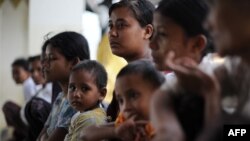Officials say 28 people have died in Burma's western Rakhine state, as a top U.N. envoy visits there to assess tensions between Buddhists and Muslims.
The outbreak of sectarian violence between ethnic Rahkines and ethnic Rohingyas has caused death and property damage on both sides. Officials say tens of thousands of people have been displaced, more than 2,500 homes burned, and food and water supplies are growing scarce.
U.N. officials say that Vijay Nambiar, Secretary-General Ban Ki-moon's advisor on Burma, visited Rakhine Wednesday. Nambiar visited the city of Maungdaw and the state capital, Sittwe, where he met with state officials.
The visit, which included Burma's Border Affairs Minister, Thein Htay, and 10 Muslim leaders from Rangoon, took place after Bangladesh denied a U.N. request that it open its borders to Rohingya people. . Bangladesh's Foreign Ministry said it is not in the country's best interest to let in the Rohingyas, who are fleeing the fighting.
Burma does not recognize Rohingyas as citizens.
Violence erupted June 3 when a mob of Buddhists in Rakhine ambushed a bus and killed 10 Rohingya Muslim passengers, in apparent retaliation for the earlier rape and murder of a Buddhist woman by three Muslims.
President Thein Sein has declared a state of emergency and sent army troops into Rakhine to keep the peace.
The outbreak of sectarian violence between ethnic Rahkines and ethnic Rohingyas has caused death and property damage on both sides. Officials say tens of thousands of people have been displaced, more than 2,500 homes burned, and food and water supplies are growing scarce.
U.N. officials say that Vijay Nambiar, Secretary-General Ban Ki-moon's advisor on Burma, visited Rakhine Wednesday. Nambiar visited the city of Maungdaw and the state capital, Sittwe, where he met with state officials.
The visit, which included Burma's Border Affairs Minister, Thein Htay, and 10 Muslim leaders from Rangoon, took place after Bangladesh denied a U.N. request that it open its borders to Rohingya people. . Bangladesh's Foreign Ministry said it is not in the country's best interest to let in the Rohingyas, who are fleeing the fighting.
Burma does not recognize Rohingyas as citizens.
Violence erupted June 3 when a mob of Buddhists in Rakhine ambushed a bus and killed 10 Rohingya Muslim passengers, in apparent retaliation for the earlier rape and murder of a Buddhist woman by three Muslims.
President Thein Sein has declared a state of emergency and sent army troops into Rakhine to keep the peace.





